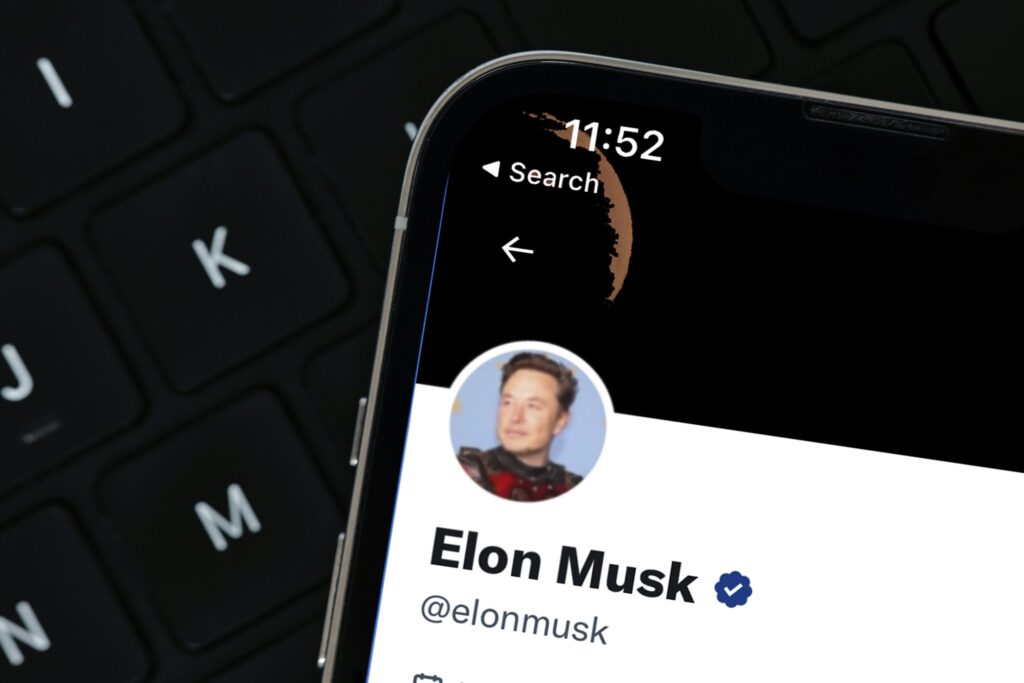Free Speech in the Digital Age: Elon Musk, Twitter, and Political Discourse on Social Media
 Image of someone reading the news from their smartphone.
Image of someone reading the news from their smartphone.
In an ever-increasing age of technology and digital advancement, social media has become seamlessly integrated into our everyday lives. In the world of politics, platforms such as Twitter, Instagram, and Facebook have become prominent spaces for discussion, both used as a tool to advance partisan agendas and as a medium to express political ideas. However, this is not limited to politics enthusiasts. With about 90 per cent of the population in both the United States and Canada being active on social media, political content has made its way to the screens of all social media users, even those who aren’t particularly interested. A recent survey done amongst U.S. adults by Pew Research Center revealed that “55 per cent of adult social media users” felt “worn out” by political content and discussion on social media.
Nonetheless, social media isn’t going anywhere, especially in the world of politics. While it is undeniable that the ability to connect with individuals across the world can foster positive discussion, it can also be a channel for misinformation and furthering extreme political ideologies. Considering the presence of digital algorithms tracking what we consume on social media, this can easily lead to a “comfortable, self-confirming feed,” as we are constantly being exposed to content that fits our personal preferences and biases rather than not. As such, the phenomenon of online filter bubbles and echo chambers has emerged to explain the isolating effects of social media, in which users are reeled into a “bubble” of content they enjoy seeing and perspectives similar to their own. Not only can this spread misinformation and fake news, but it can also foster dangerous and extreme political ideologies as people are unexposed to diverse views and opposing opinions. One of the key examples in current discourse is the January 6 Capitol Riot which was largely organized through social media such as Facebook, Twitter, and Parler—a right-wing social media platform. Through “closed social media networks” that foster beliefs in the conspiracy that the election was rigged and fraud, this case provides a real example of the dangers of echo chambers. It was following the Capitol Riot that platforms such as Twitter and Facebook banned former President Donald Trump due to his role in spreading false information about rigged election results on social media, which led to the riot at the Capitol. The ban sparked a widespread debate about the role of private social media companies in regulating content, reigniting discussions about the balance between protecting public safety and safeguarding free speech.
The controversy was further fueled when Twitter recently lifted the ban on President Trump after Elon Musk took over the company, leading to a decrease in overall censorship and moderation on the platform. This change in policy has led to increased criticism and calls for greater regulation of social media companies. Some argue that they should be considered public spaces subject to First Amendment protections, while others believe that as private companies, they have the right to set their own policies for the content shared on their platforms. So the debate continues: is the principle of freedom of speech, or the First Amendment in the U.S., protected on social media?
The Case for “Free Speech” for All

On one hand, individuals such as Elon Musk and supporters of his decision to unban Trump argue that censorship on social media undermines the fundamental right to freedom of expression. In the U.S., the First Amendment guarantees the inherent right for people to speak their thoughts, even if they are controversial or dangerous. This right is essential to democracy, and proponents argue it applies even to private companies such as Twitter.
For instance, in a recent case in Texas, a new social media law went into effect, preventing companies from banning individuals based on their political viewpoints. This came after the companies, NetChoice and the Computer & Communications Industry Association (CCIA), sued the state of Texas for the 2021 House Bill 20 and argued for the right of companies to decide the content on their platforms. Following this, the 5th U.S. Circuit Court of Appeals disagreed, claiming the CCIA was “seeking protection to muzzle free speech.” Thus, the new law states that companies cannot “restrict a user’s access…based on [their] viewpoint or ideology,” forcing tech companies to “give equal treatment” to all speech, “including extremist views.”
This stance has particularly been taken on by conservatives, who have historically claimed that primary social media platforms “exhibit political bias.” In 2019, Republican Senators, led by Senator Ted Cruz, accused big tech companies—Twitter, Google and Facebook—of “liberal leanings” and bias against the Republican party. This was supported by instances such as when Republican Senator Marsha Blackburn had a campaign ad “briefly barred by Twitter” in 2017, which was later said to be a mistake. In response, it was emphasized that “controversial content” from both sides was monitored, and ultimately, there has been no evidence found of companies such as Twitter and Facebook outwardly limited Republican reach.
The Case for Regulation
On the other hand, proponents of more regulation on social media emphasize that it is of critical importance for companies to be able to moderate content published for the sake of public safety and to prevent misinformation and violent forms of expression.
In October 2022, Elon Musk’s takeover of Twitter, in which he emphasized his support for free speech and less censorship on Twitter, caused fear of what this takeover would mean. Many individuals have raised concerns over hate speech and misinformation going more viral than the truth, which could very well be dangerous to democracy itself. The principle of limited monitoring and regulation on platforms such as Twitter is seen by many as one fostering “racism and conspiracy theories as gospel.” Furthermore, while Musk justified the unbanning of users like former President Donald Trump under the premise of free speech and expression for all, there has been the simultaneous restriction of high-profile journalists who have criticized Musk’s views and policies. The selective nature of the free speech under Musk’s Twitter suggests the decision was driven by power rather than for the rights of the public, only furthering the need for greater regulation on social media.
Simultaneous with the aforementioned law in Texas, where the 5th U.S. Circuit Court of Appeals upheld a law protecting all speech on social media, the 11th U.S. Circuit Court of Appeals upheld a ruling in Florida that allowed social media platforms to remove and limit posts as they saw fit. With the rulings of these two cases being conflicting in nature, a Supreme Court decision on both these cases is pending, which may completely change the way moderation and regulation on social media are undergone.
Plaintiffs in the aforementioned Texas and Florida cases have cited examples such as Russian propaganda in support of its invasion in Ukraine, “neo-Nazi or KKK screeds denying or supporting the Holocaust,” and encouraging risky behaviour among children as dangers to limited moderation on social media. Not to mention past events of conspiracies such as QAnon, false information on COVID-19, and the organization of the January 6th Capitol Riot that all originated from the use of social media as a political tool. More recently, the CCIA has claimed that not allowing social media moderation is also a violation of First Amendment rights, as it removes businesses’ “editorial control” and forces them to “publish speech they do not wish to disseminate.” Other proponents argue that the First Amendment in the U.S. does not actually apply to private companies such as Twitter, which makes it a right for these platforms to censor certain forms of speech.

Altogether, in a continuously evolving digital age, the idea of free speech and interpretations of the First Amendment in social media continues to be an ongoing debate. As individuals, the increasing influence of social media in the political world highlights the need for greater awareness and caution when it comes to what we consume on these platforms. While freedom of speech is important, it can also be dangerous, particularly when it comes to spreading false information or inciting dangerous actions. It is crucial to be aware of what we are consuming on social media and to avoid getting trapped in echo chambers of political ideologies, taking in news from just anywhere and anyone. The need to balance the right to free speech with the need to protect public safety highlights the complex nature of the ongoing debate surrounding censorship and moderation on social media. All things considered, it is important to approach social media with a critical eye and to carefully consider the information that is being presented in any context.
Person reading news from a smartphone. Featured image by Pxhere is licensed under CC0 1.0.
Edited by Sarenna McKellar.
